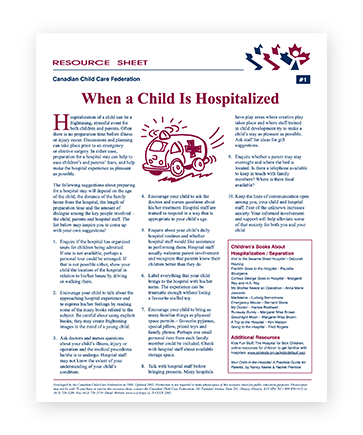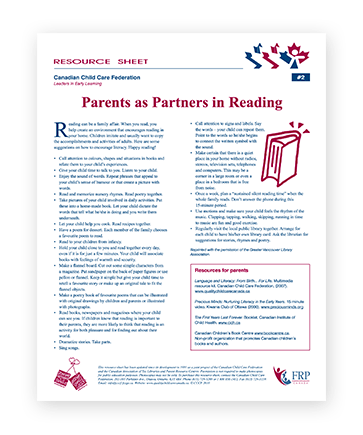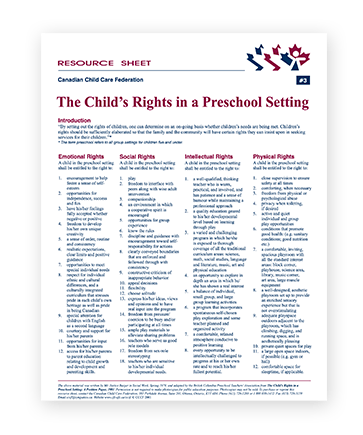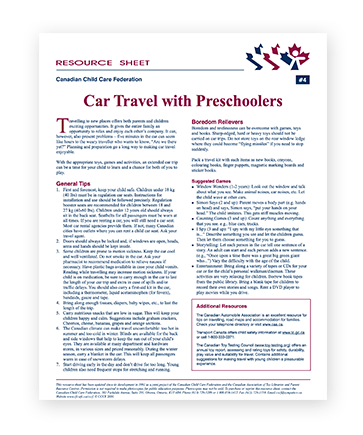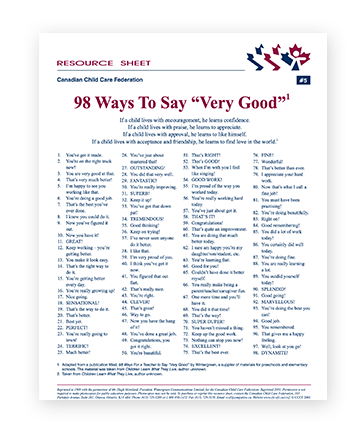PDF Archive
Please enjoy some of our legacy content from our first website. As we continue to modernize our site, we’ll be bringing you more of the best content from our sector specialists. Version française
- When a Child is Hospitalized
- Parents as Partners in Reading
- The Child’s Rights in a Preschool Setting
- Car Travel with Preschoolers
- 98 Ways To Say “Very Good”
- “I See! I Want!”
- How Well Do You Know Your Child?
- Musical Playtime
- Returning to Work With an Infant
- Helping Children Understand Death
- Healthy Habits Include Fitness
- unavailable
- Protecting Children: Helpful Rules to Keep Young People Safe
- Recycling for Fun
- Children and Creativity
- Revenge on the Superheroes
- Home Alone
- When Jack Frost Comes Nipping
- Stress in Children
- Sunshine – Approach with Caution
- Safety in the Arts
- Cooking and Learning Together
- Developmentally Appropriate Practices in School-Age Child Care
- Food Safety for Everyone
- Seven Steps to Oral Hygiene for Children
- Toy Safety
- Ear Infections, Hearing Loss, and Children
- Water Safety
- Toxic Plant List
- Respecting the Children in Our Care
- Encouraging Language Acquisition in Young Children
- unavailable
- unavailable
- Making a Quality Child Care Choice
- Helping Children Respect and Appreciate Diversity
- Helping Young Children Tell the Truth
- Celebrate National Child Day – November 20
- Communicating with a Child who has Special Needs
- unavailable
- Babies and Toddlers Need Language Play Too
- Coping with Separation Anxiety
- Managing the Internet
- Exploring Nature with Children
- Comforting Your Young Child
- Understanding Learning Styles
- Making Active Choices Every Day
- Polyvinyl Chloride Toys
- Tips for Parenting Children with Challenging Behaviour
- Teaching Children to Respect Dogs
- Choosing Good Video Games
- Your Child’s Relationships
- Supporting your Child’s Physical Activities
- Not all Bugs are Created Equal: Use Antibiotics Wisely
- Children’s Healthy Eating
- Resolving Conflicts – Promoting Peace
- Early Identification for Children with Special Needs
- Supporting Breastfeeding in Child Care
- unavailable
- Keeping Current through Lifelong Learning
- unavailable
- unavailable
- unavailable
- Respecting Children’s Rights in Practice
- Respecting Children’s Rights at Home
- The Best Parent Ever
- Fear and Loathing: A Guide to Bullying Behaviour
- unavailable
- Children at Play in the Great Outdoors
- The World is the Children
- Caring for Children with Fetal Alcohol Syndrome
- Connecting with Your Community Health Partners: Paediatricians
- Supporting Science Learning at Home
- Connecting with Your Community Health Partners: Dieticians
- Teaching Children About Safe Fire Exits at Home
- Moving and Growing: Building a Lifelong Habit of Physical Activity
- Connecting With Your Community Partners: Child Welfare Workers
- Supporting Children to Learn Through Play
- I Have the Right to Play!
- Bringing Back Physical Activity in Childhood
- Outdoor Play Environments
- Supporting and Encouraging Children’s Right to be Heard
- Physical Punishment – It’s Harmful and It Doesn’t Work
- Toilet Learning
- Hand Washing: The Best Prevention for Colds and Flu
- Building a Partnership with Your Child Care Practitioner
- Building Partnerships with Families
- Practitioners and Families Together: Encouraging Positive Behaviour
- Strengthening Communication Skills
- Parents as Partners: Enhancing Self-Esteem
- Problem-Solving Skills — Enhancing Children’s Social and Emotional Well-Being and Resilience
- Families and Practitioners Working Collaboratively to Support Cultural Identity in Young Children
- Encouraging Aboriginal Cultural Identity at Home and in Child Care
- Growing a Green Garden – Organic Gardening in a Child Care Setting
- Building a Foundation for Numeracy
- Ages and Stages of Numeracy Development
- Preventative Steps When Caring for Children in Your Home
- How Do You Know That You Are Moving Towards Inclusion?
- Learning to use “Words”!
- Clean Air for Healthy Children
- Nine Crucial Elements of Early Childhood Education
- Promoting Indigenous Languages in Early Learning and Child Care
- Child Care: A Canadian Snapshot
- The Value of Play for Young Children
- Primary Care
- Creating a Personal Approach to Leadership
- Strategies for Dealing with Challenging Behaviours
- unavailable
- unavailable
- unavailable
Why Become A Member?
Start Your ECE Journey Here
For Every Stage In Early Learning
Discover information from all over our site on this page
Learn More
Professional Development for ECEs
Learn At Your Own Pace
Enjoy webinars, articles, book reviews, courses, and find important data for Canadian ECEs
Learn More


